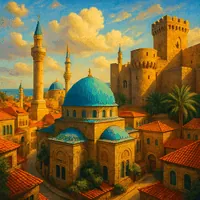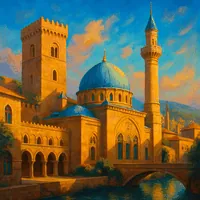Nestled between the Mediterranean coastline and the rugged mountains of Lebanon, Tripoli is a city where the echoes of history resonate through its vibrant souks and ancient architecture. Unlike any other, Tripoli is renowned for its unique legacy of medieval Mamluk architecture, boasting the highest concentration of Mamluk-era structures outside of Cairo. Its iconic citadel, known as the Citadel of Raymond de Saint-Gilles, stands as a testament to its storied past, while the aromatic, spice-filled air of its souks captures the essence of the Levant.
Notable points about Tripoli
- Cultural Melting Pot: Tripoli is renowned for its rich tapestry of cultural influences, a result of various civilizations that have left their mark, including the Phoenicians, Greeks, Romans, and Ottomans. This diverse heritage is reflected in its architecture, cuisine, and vibrant traditional markets.
- Architectural Marvels: The city is home to the second-largest collection of Mamluk architecture after Cairo, with structures such as the Taynal Mosque and the Madrasa Al-Qartawiyyah showcasing Tripoli's architectural grandeur and historical significance.
- The Old City and Souks: Tripoli's Old City, with its labyrinthine streets and bustling souks, offers an authentic Middle Eastern experience. Its markets, filled with spices, textiles, and fresh produce, provide a sensory delight for visitors and locals alike.
- A Sweet Tooth's Paradise: Known as the "Sweet Capital" of Lebanon, Tripoli is famous for its delicious Middle Eastern desserts. Visitors can indulge in baklava, maamoul, and kunafa, among other sweet treats, making it a must-visit for pastry enthusiasts.
- Coastal Charm: Unlike many other Lebanese cities, Tripoli boasts a beautiful coastline with sandy beaches and picturesque views of the Mediterranean Sea. It's an ideal spot for romantic sunset walks or a family day by the water.
- Traditional Craftsmanship: Tripoli is distinguished by its thriving artisan community. Local craftspeople continue to produce traditional soap, copperware, and textile goods, reflecting the city's enduring commitment to preserving age-old skills.
- Festivals and Events: The city hosts various cultural and religious festivals throughout the year, such as the Mawlid Al-Nabawi celebrations. These events provide a unique opportunity to experience local customs and traditions firsthand.
- Educational Hub: For those interested in history and academia, Tripoli is home to the Ottoman-era Al-Mina campus of the University of Tripoli. The city's focus on education makes it an attractive destination for scholars and students alike.
- Unique Religious Sites: Tripoli stands apart from other Lebanese cities due to its mosques and madrassas, which highlight its Islamic heritage. Sites like the Mansouri Great Mosque provide insight into the city's religious and historical significance.
- Affordability and Hospitality: Unlike Beirut and other Lebanese cities, Tripoli offers a more affordable cost of living, making it an attractive destination for single people, couples, and families looking for authentic experiences on a budget, coupled with the warmth and hospitality of its residents.


